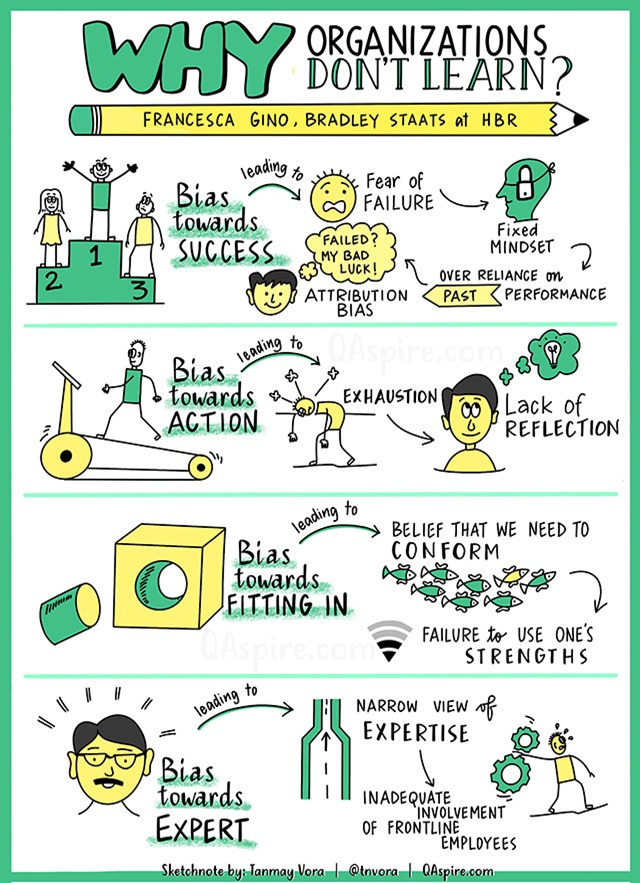Why Organizations Don’t Learn?
Tanmay Vora
Organizations that don’t learn constantly, adapt continuously and execute relentlessly are more likely to be disrupted by constant change and competition. In times like these when COVID19 pandemic has fundamentally altered the ways of working, consumption and business models, organizations that have invested in building culture of continuous learning are more likely to survive and thrive.
Peter Senge, in his book defined a learning organization as an organization:
“where people continually expand their capacity to create the results they truly desire, where new and expansive patterns of thinking are nurtured, where collective aspiration is set free, and where people are continually learning to see the whole together.”
We have to go beyond formal learning methods if we have to truly build learning organizations in a rapidly changing world. A learning organization is not possible without learning individuals (and learning because of their intrinsic motivation to raise the bar) and individuals learn the most in the context of work with each in a culture that promotes informal learning and collective sense-making.
I emphasized culture because it can be one of the biggest bottlenecks in how organizations learn and apply what they learn to create meaningful results. It doesn’t matter how much you invest in formal learning, tools and methods, if you do not have a culture where people are encouraged to experiment and share without any fear, real learning may not come to the fore.
Why do companies struggle to become and remain learning organizations? In November 2015 issue of HBR, I came across an article by Francesca Gino and Bradley Staats titled “Why Organizations Don’t Learn” where they outline the cultural and individual biases that don’t allow organizations to learn. The article also also provides useful tips to overcome those biases.
Here is a revised sketchnote I created to distill key biases that keep organizations from learning. To know what you can do to overcome these biases, I recommend you read the full HBR article.
[New] Raise The Bar: Pack of Sketchnotes on Leadership, Learning and Change
Having an attitude to lead and a mindset to learn are vital to thrive in a new world of work. The best leaders are relentless learners. This is a collection of 68+ powerful and actionable insights in form of hand drawn sketchnotes. These insights are packed with wisdom to help you raise the bar of leadership and learning for yourself, your teams and your organization. Do check it out.
Food For Thought – Quotes I Loved
“Learning can be defined as occurring under two conditions. First, learning occurs when an organization achieves what it intended; that is, there is a match between its design for action and the actual outcome. Second, learning occurs when a mismatch between intention and outcome is identified and corrected; that is, a mismatch is turned into a match. Single-loop learning occurs when matches are created, or when mismatches are corrected by changing actions. Double-loop learning occurs when mismatches are corrected by first examining and altering the governing variables and then the actions.
– Chris Argyris, “The Manager’s Academic” in Business (2003)
As we, the leaders, deal with tomorrow, our task is not to try to make perfect plans. Our task is to create organizations that are sufficiently flexible and versatile that they can take our imperfect plans and make them work in execution. That is the essential character of the learning organization.
– Gordon R. Sullivan & Michael V. Harper, Hope is Not a Method (1997)
“Our prevailing system of management has destroyed our people. People are born with intrinsic motivation, self-respect, dignity, curiosity to learn, joy in learning. The forces of destruction begin with toddlers—a prize for the best Halloween costume, grades in school, gold stars—and on up through the university. On the job, people, teams, and divisions are ranked, reward for the top, punishment for the bottom. Management by Objectives, quotas, incentive pay, business plans, put together separately, division by division, cause further loss, unknown and unknowable.”
― Peter M. Senge, The Fifth Discipline: The Art & Practice of The Learning Organization
From My Blogroll – A Round-up
- Wally Bock’s insights on Taking control in Uncertain Times
- Kurt Harden on Taking the Bad with Good and Living in Reality
- Michael Wade is always amazing.
- Harold Jarche on Sensemaking in Uncertainty
- Nicholas Bate on Being Lucky
- Kavi Arasu on Importance of Humor at Workplace

